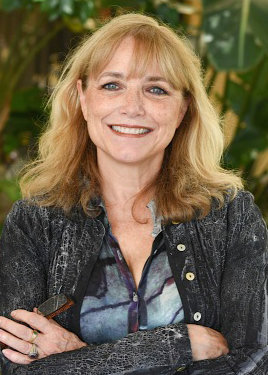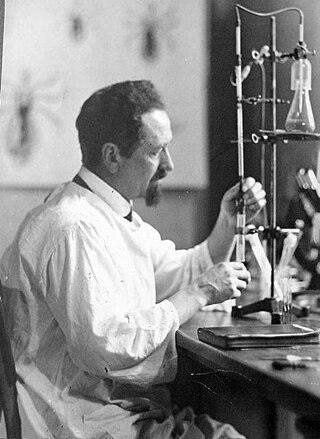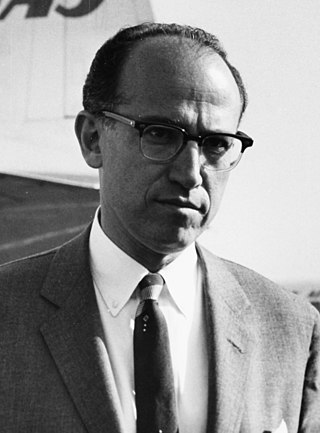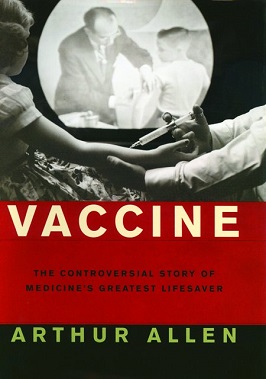Related Research Articles
The year 1937 in science and technology involved some significant events, listed below.

Karen Jane Allen is an American film, television and stage actress. She made her film debut in the comedy film Animal House (1978), which was soon followed by a small role in Woody Allen's romantic comedy-drama Manhattan (1979) and a co-lead role in Philip Kaufman's coming-of-age film The Wanderers (1979), before co-starring opposite Al Pacino in William Friedkin's crime thriller Cruising (1980).

Robert Francis Kennedy Jr., also known by his initials RFK Jr., is an American politician, environmental lawyer, anti-vaccine activist, and conspiracy theorist. In 2024, he was nominated by President-elect Donald Trump for United States Secretary of Health and Human Services in Trump's second administration.

Rudolf Stefan Jan Weigl was a Polish biologist, physician and inventor, known for creating the first effective vaccine against epidemic typhus. He was nominated for the Nobel Prize in Medicine each year between 1930 and 1934, and from 1936 to 1939.

Vaccine hesitancy is a delay in acceptance, or refusal, of vaccines despite the availability of vaccine services and supporting evidence. The term covers refusals to vaccinate, delaying vaccines, accepting vaccines but remaining uncertain about their use, or using certain vaccines but not others. Although adverse effects associated with vaccines are occasionally observed, the scientific consensus that vaccines are generally safe and effective is overwhelming. Vaccine hesitancy often results in disease outbreaks and deaths from vaccine-preventable diseases. Therefore, the World Health Organization characterizes vaccine hesitancy as one of the top ten global health threats.
Ludwik Fleck was a Polish Jewish and Israeli physician and biologist who did important work in epidemic typhus in Lwów, Poland, with Rudolf Weigl and in the 1930s developed the concepts of the "Denkstil" and the "Denkkollektiv".

Paul Allan Offit is an American pediatrician specializing in infectious diseases, vaccines, immunology, and virology. He is the co-inventor of a rotavirus vaccine. Offit is the Maurice R. Hilleman Professor of Vaccinology, professor of pediatrics at the Perelman School of Medicine at the University of Pennsylvania, former chief of the Division of Infectious Diseases (1992–2014), and the director of the Vaccine Education Center at the Children's Hospital of Philadelphia.

Fantastic Four: World's Greatest Heroes is an animated television series based on the Marvel Comics' Fantastic Four comic book series. This is the team's fourth foray into animation. The series is co-produced by American company Marvel Studios and French company MoonScoop Group, with the participation of M6 and Cartoon Network Europe, and is distributed by Taffy Entertainment.

Paul D. Thacker is an American journalist who reports on science, medicine, and the environment. He was a lead investigator of the United States Senate Committee on Finance for Senator Chuck Grassley, where he examined financial links between physicians and pharmaceutical companies.
Politico, known originally as The Politico, is an American political digital newspaper company. Founded by American banker and media executive Robert Allbritton in 2007, it covers politics and policy in the United States and internationally, with publications dedicated to politics in the U.S., European Union, United Kingdom, and Canada, among others. Primarily providing distributed news, analysis and opinion online, it also produces printed newspapers, radio, and podcasts. Its coverage focuses on topics such as the federal government, lobbying and the media.

Michael Allen is an American political journalist. He is the co-founder and executive editor of Axios and the former chief political reporter for Politico. While at Politico, he wrote the daily Playbook; in April 2010, in reference to his frequent correspondence with White House communications director Dan Pfeiffer, The New York Times called him "The Man The White House Wakes Up To." Prior to joining Politico for its 2007 launch, he worked at numerous other publications, including The New York Times and Time.
Mark Robin Geier is an American former physician and controversial professional witness who testified in more than 90 cases regarding allegations of injury or illness caused by vaccines. Since 2011, Geier's medical license has been suspended or revoked in every state in which he was licensed over concerns about his autism treatments and his misrepresentation of his credentials to the Maryland Board of Health, where he falsely claimed to be a board-certified geneticist and epidemiologist.
A vaccine is a biological preparation that provides immunity to an infectious disease.

Tadeusz Baranowski was a Polish chemist. From 1965 to 1968 he was the rector of Wrocław Medical University.

Sharyl Attkisson is an American journalist and television correspondent. She hosts the Sinclair Broadcast Group TV show Full Measure with Sharyl Attkisson.

Jonas Edward Salk was an American virologist and medical researcher who developed one of the first successful polio vaccines. He was born in New York City and attended the City College of New York and New York University School of Medicine.

A louse-feeder was a job in interwar and Nazi-occupied Poland, at the Lviv Institute for Study of Typhus and Virology and the associated Institute in Kraków, Poland. Louse-feeders were human sources of blood for lice infected with typhus, which were then used to research possible vaccines against the disease.

Vaccine: The Controversial Story of Medicine's Greatest Lifesaver is a 2007 book by freelance writer Arthur Allen. The book describes the history of vaccination, beginning in 1796 when the smallpox vaccine was pioneered by Edward Jenner, and including mandatory vaccination policies during World War II in the United States military. It ends with a discussion of the vaccine-autism controversy.

Julie E. Ledgerwood is an American allergist and immunologist, who is the chief medical officer and chief of the Clinical Trials Program at the Vaccine Research Center (VRC) of the National Institute of Allergy and Infectious Diseases (NIAID), part of the National Institutes of Health in Bethesda, Maryland. She is a Doctor of Osteopathic Medicine.
Marian Ciepielowski was a Polish physician and scientist. A survivor of the Buchenwald concentration camp, he is best known for his activity as a saboteur within the camp's vaccine production unit. Ciepielowski's actions resulted in useful vaccines being distributed to camp inmates, while inactive and useless "vaccines" were sent to Nazi soldiers. After the war he emigrated to the United States.
References
- 1 2 3 4 Hebert, Gina (16 July 2007). "Vaccine Controversy to be Discussed at MBL Bioethics Lecture, July 26". Marine Biological Laboratory. Archived from the original on 10 September 2015. Retrieved 12 November 2015.
- 1 2 3 "Arthur Allen". Politico. Retrieved 12 November 2015.
- ↑ Katz, Samuel L. (9 August 2007). "Book Review Vaccine: The Controversial Story of Medicine's Greatest Lifesaver By Arthur Allen. 523 pp., illustrated. New York, W.W. Norton, 2007. $27.95. 978-0-393-05911-3". New England Journal of Medicine. 357 (6): 628. doi:10.1056/NEJMbkrev58301.
- ↑ "Arthur Allen". Washington Independent. Retrieved 15 December 2024.
- ↑ "'Ripe': One Man's Quest For The Perfect Tomato". NPR. 30 July 2010. Retrieved 12 November 2015.
- ↑ Schneider, Howard (18 July 2014). "Book Review: 'The Fantastic Laboratory of Dr. Weigl' by Arthur Allen". Wall Street Journal. Retrieved 12 November 2015.
- ↑ "Arthur Allen". KFF Family News. Retrieved 15 December 2024.